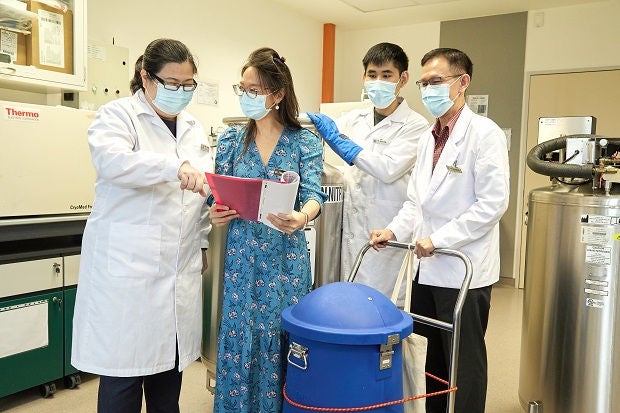
Chimeric antigen receptor (CAR) T-cell therapy modifies patients’ immune cells to find and destroy cancer cells.
Mention chimeric antigen receptor (CAR) T-cell therapy, and Assistant Professor Francesca Lim perks up perceptibly. Describing it as her favourite topic and how “the stars aligned” to lead her to specialise in this relatively new field of cancer treatment, the Senior Consultant at Singapore General Hospital’s (SGH) Department of Haematology admitted, though, that the subject initially did not interest her.
However, a two-year study trip to the University of Texas MD Anderson Cancer Center opened her eyes to the potential of this form of immunotherapy, where the patient’s T-cells are engineered to fight and overcome specific cancer cells such as very advanced leukaemia and lymphomas.
“At the time, we were just beginning to understand cell therapy in Singapore. Witnessing how CAR T-cell therapy was being explained to patients, I found that very new and fascinating,” said Asst Prof Lim.
Upon her return, Asst Prof Lim was entrusted with setting up the CAR T-cell clinical programme for treating some cancers at SGH.
T-cells, also known as the body’s ‘fighter’ cells because they help fight against infections and cancers, are collected from a patient’s blood through a process called leukopheresis. They are then sent to a special manufacturing facility to be modified to express a special receptor, known as the CAR, on their surface, which will recognise the cancer target (the antigen) and attack the cancer cells. “These modified cancer-fighting CAR cells are grown in the laboratory and given to patients by infusion,” said Asst Prof Lim. She credits her colleagues, and in particular, her department seniors, for inspiring her to choose the specialty.
“Having rotated through gastroenterology and cardiology, somehow, I enjoyed my haematology posting the most. Part of it was because of the doctors whom I interacted with,” she said, naming Professor William Hwang (former Head of Department and current Chief Executive Officer of National Cancer Centre Singapore), and Senior Consultants, Dr Ang Ai Leen and Dr Linn Yeh Ching. “The discipline, the focus on the patient, and the dedication that they had in caring for the patients really impressed me,” she added.
Asst Prof Lim also draws strength from her patients. “They want to know about their disease and they want to take charge,” she said.
While it has been available in Singapore for some time, CAR T-cell therapy only received approval for commercial use from both the United States’ Food and Drug Administration and Singapore’s Health Sciences Authority in March 2021.
Although promising, CAR-T cell therapy is still considered an alternative method of treatment that requires many more years of trials, Asst Prof Lim stressed. The therapy carries a hefty price tag and stringent criteria, including cancer type (relapsed/refractory acute B-cell lymphoblastic leukaemia and diffuse large B-cell lymphoma).
Patients must also have undergone standard treatments before they can be considered for CAR T-cell therapy. So far, only a handful of patients have been treated with compassionate academic CARs, clinical trials and commercial CAR products.

<<Mr Tan Chee Mun,
who became SGH’s
and Singapore’s first
patient to receive
commercial
CAR T-cell therapy,
is surrounded by his
care team, (from
left) Associate
Professor Aloysius
Ho, Assistant Nurse
Clinician Rohani
Salleh, Asst Prof
Francesca Lim,
Mr Tan’s wife,
Mdm Tay Li Li,
Assistant Nurse
Clinician and
Apheresis Nurse
Jessica Teo, and
Senior Clinician
Transplant Manager
Lee Jing Jing.>>
Nevertheless, Asst Prof Lim hopes for greater awareness of CAR therapy and its potential to treat complex blood cancers. Her department organises outreach activities to raise awareness among general practitioners so that they can direct patients to specialist centres.
Asst Prof Lim comes from a family of doctors. Her father is a cardiologist, her two sisters are oncologists, and her brother is a medical officer. She met her husband, a surgeon in another public hospital, in medical school in the UK. She was posted to several local hospitals before joining SGH. “I’ve received my 10-year award, so I’m sure it has been a long time!” she quipped.
Like her own family, Asst Prof Lim has a large family by modern standards. She and her husband spend time with their four children, aged between one and 10, visiting parks, watching films and having meals. With support from her parents and in-laws, she gets to spend some me time relaxing in a cafe with a good book.
“I like to read about people’s life stories, biographies and books on life lessons. They teach me about peace, forgiveness and being focused. I think such stories bring me back to reality and core values — to what is important,” said Dr Lim.













 Get it on Google Play
Get it on Google Play